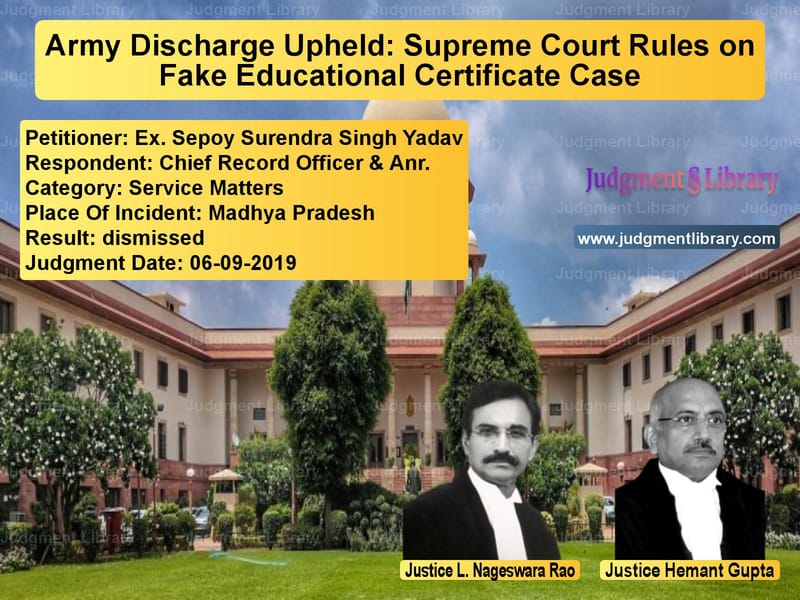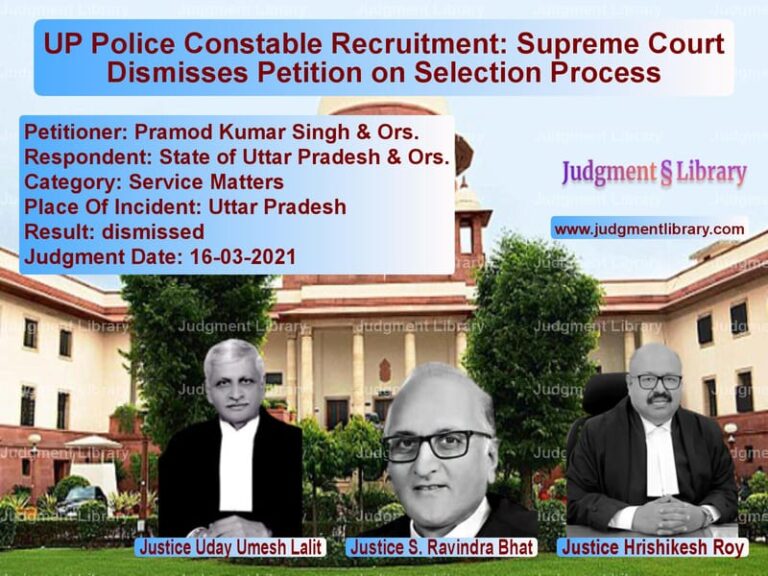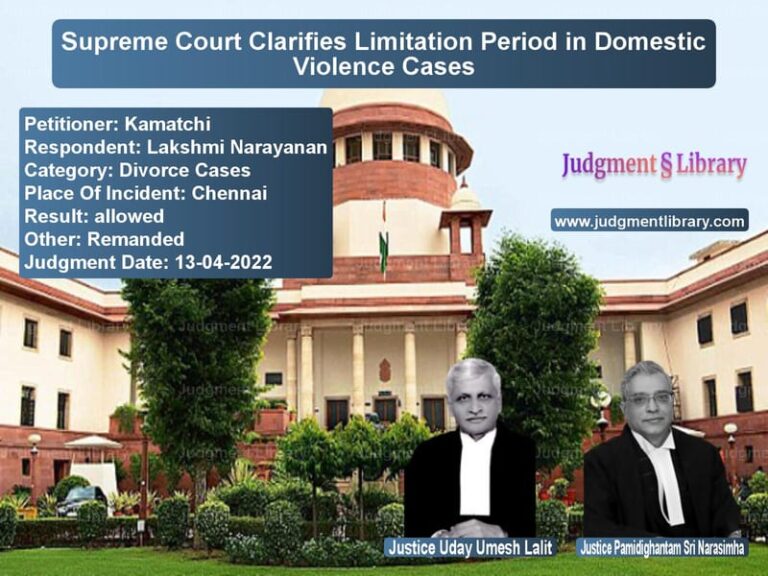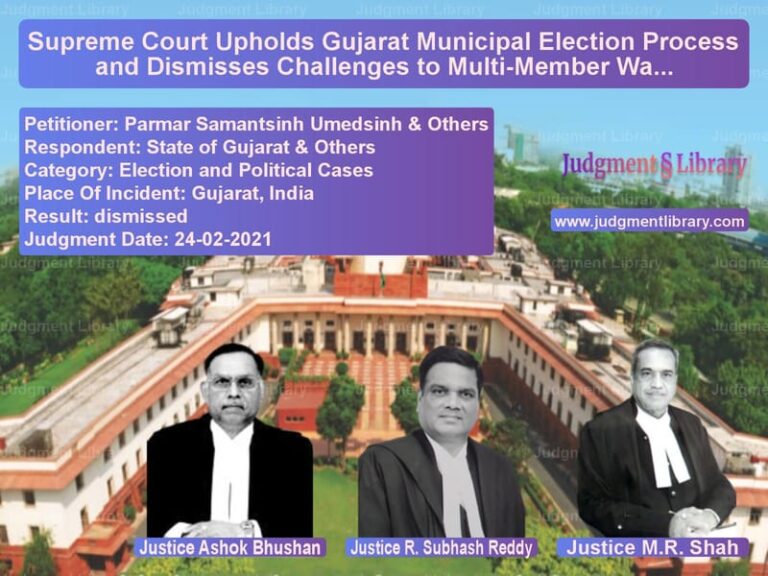Army Discharge Upheld: Supreme Court Rules on Fake Educational Certificate Case
The case of Ex. Sepoy Surendra Singh Yadav vs. Chief Record Officer & Anr. revolves around the dismissal of an army personnel for submitting a false educational certificate at the time of enrollment. The Supreme Court, in its judgment on September 6, 2019, upheld the discharge order and ruled that the appellant’s exoneration in a Summary Court Martial did not bar the army from discharging him for lack of requisite qualifications.
Background of the Case
The appellant, Surendra Singh Yadav, was enrolled in the Indian Army on April 26, 1991. At the time of his appointment, he submitted a matriculation certificate issued by the Madhyamik Shiksha Mandal, Gwalior, Madhya Pradesh. However, upon verification, it was found that the certificate was not genuine.
A charge-sheet was issued under Section 44 of the Army Act, 1950, which pertains to false answers given during enrollment. The appellant admitted during a preliminary inquiry that he had no proof of having passed the matriculation examination in 1988.
Following this, he was tried by a Summary Court Martial and found guilty under Section 44. As a result:
- He was dismissed from service.
- He was sentenced to three months of rigorous imprisonment in a civil jail.
Subsequently, the Reviewing Authority set aside the termination order and sentence, recommending that the appellant be reinstated and that separate discharge proceedings be initiated. Accordingly, the appellant was reinstated on November 27, 1992.
A show cause notice was issued to him on May 27, 1993, seeking an explanation as to why he should not be discharged. He did not respond, leading to his discharge on July 10, 1993. The appellant challenged this discharge before the High Court, which transferred the case to the Armed Forces Tribunal, Lucknow Bench. The Tribunal dismissed his petition, leading to the present appeal before the Supreme Court.
Legal Issues and Arguments
Arguments by the Appellant:
- The discharge order under Rule 13(3) Table III (v) of the Army Rules, 1954, was without jurisdiction.
- Once he was exonerated by the Summary Court Martial, the army could not initiate fresh discharge proceedings.
- The order of discharge amounted to double jeopardy and was thus legally unsustainable.
- He relied on the Supreme Court’s ruling in Union of India & Anr. vs. Purushottam to support his argument.
Arguments by the Respondents (Union of India):
- Exoneration in a Summary Court Martial does not prevent the army from initiating separate discharge proceedings.
- The subject matter of the Summary Court Martial (false certificate) was different from the issue of educational qualifications required for service.
- The discharge order was legally justified under Rule 13(3) Table III (v) of the Army Rules.
- Since the appellant did not possess the necessary educational qualifications, he was unfit for continued service.
Supreme Court’s Observations
The Supreme Court examined Section 44 of the Army Act, which states:
“Any person having become subject to this Act who is discovered to have made at the time of enrollment a wilfully false answer to any question set forth in the prescribed form of enrollment… shall, on conviction by court-martial, be liable to suffer imprisonment for a term which may extend to five years or such less punishment as is in this Act mentioned.”
The Court ruled that the initiation of a Summary Court Martial for an offense under Section 44 and the subsequent exoneration did not bar the army from separately proceeding with discharge.
Addressing the argument of double jeopardy, the Court stated:
“The first proceeding under Section 44 was related to producing a false certificate. The discharge proceedings were initiated for lack of requisite educational qualifications. Since the charges were not the same, there was no double jeopardy.”
The Court further clarified:
“Exoneration in a Summary Court Martial is not a bar for initiation of proceedings for discharge. The appellant does not possess the requisite educational qualifications and, therefore, cannot be continued in service.”
Key Rulings and Conclusion
The Supreme Court dismissed the appeal and ruled:
- The discharge order under Rule 13 of the Army Rules was valid.
- Double jeopardy did not apply since the Summary Court Martial and the discharge proceedings were based on different grounds.
- The army had the authority to discharge the appellant for failing to meet the educational qualifications.
- The decision of the Armed Forces Tribunal, Lucknow Bench, was upheld.
This judgment reaffirms that false information at the time of enrollment is a serious issue and that military authorities have the power to discharge personnel who fail to meet the requisite qualifications, irrespective of court-martial proceedings.
Petitioner Name: Ex. Sepoy Surendra Singh Yadav.Respondent Name: Chief Record Officer & Anr..Judgment By: Justice L. Nageswara Rao, Justice Hemant Gupta.Place Of Incident: Madhya Pradesh.Judgment Date: 06-09-2019.
Don’t miss out on the full details! Download the complete judgment in PDF format below and gain valuable insights instantly!
Download Judgment: Ex. Sepoy Surendra S vs Chief Record Officer Supreme Court of India Judgment Dated 06-09-2019.pdf
Direct Downlaod Judgment: Direct downlaod this Judgment
See all petitions in Termination Cases
See all petitions in Public Sector Employees
See all petitions in Judgment by L. Nageswara Rao
See all petitions in Judgment by Hemant Gupta
See all petitions in dismissed
See all petitions in supreme court of India judgments September 2019
See all petitions in 2019 judgments
See all posts in Service Matters Category
See all allowed petitions in Service Matters Category
See all Dismissed petitions in Service Matters Category
See all partially allowed petitions in Service Matters Category







